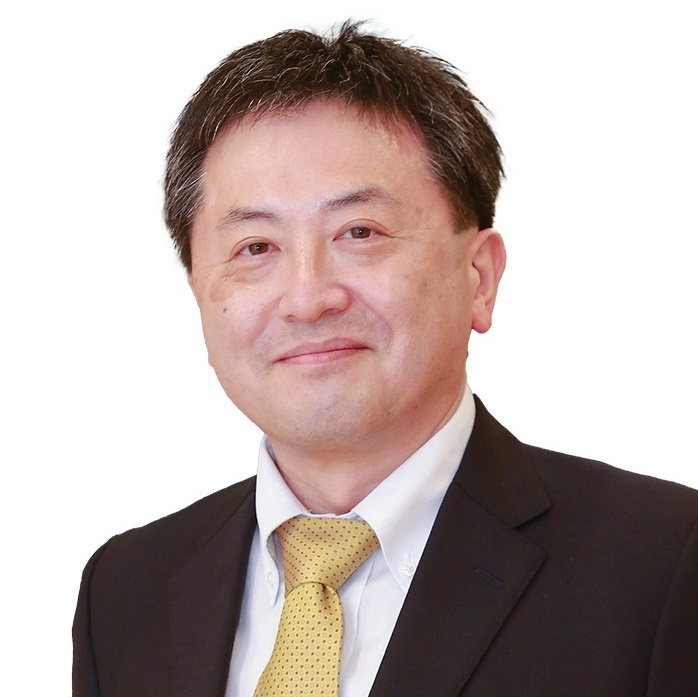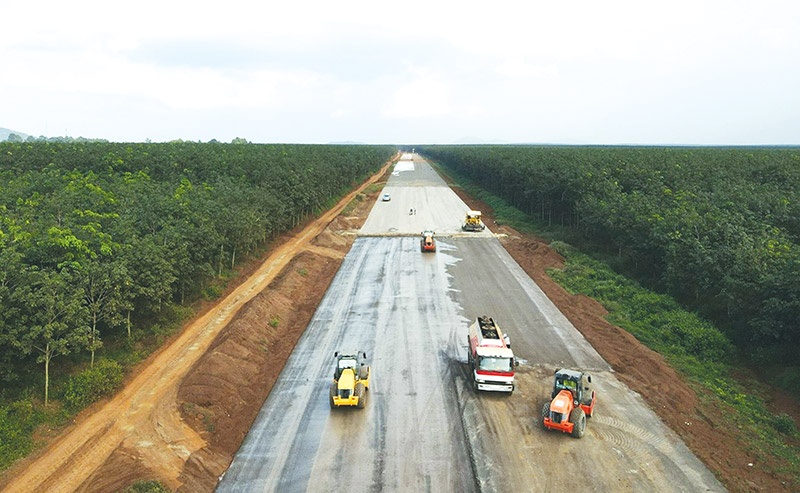Supporting Vietnam through official Japanese assistance
 |
| Shimizu Akira, chief representative of the Vietnam Office of the Japan International Cooperation Agency |
There is no doubt that infrastructure development in a developing country is crucially important to the economic development of the country. In many developing countries, an insufficient and poor infrastructure has resulted in stagnation in the flow of resources and difficulty in absorbing investment capital, causing bottlenecks and directly affecting economic growth.
Vietnam in the 1990s was also lacking key economic infrastructure such as power plants, high-quality national highways, expressways, deep sea ports, and more. The underdeveloped infrastructure system at that time was a major obstacle to attracting foreign investment enterprises (FIEs). Since then, the Vietnamese government has continuously put high priority on rehabilitation and development of that infrastructure.
Aligned with the consistent policy of the Vietnamese government on the development of key infrastructure as stated in socioeconomic development strategies from 1996 to 2030, the Japan International Cooperation Agency (JICA), together with other donors, has intensively supported infrastructure in several sectors in Vietnam.
So far, a total length of about 3,000km of road in Vietnam has been renovated or constructed with JICA’s support. The renovation of National Highway (NH) 1 supported by JICA, the World Bank, and the Asian Development Bank has strengthened the most important traffic corridor in the country.
JICA has intensively helped to improve the transport network in the Northern Key Economic Zone of Vietnam, with the renovation of NH 10, 5, and 18 in parallel with the renovation of Haiphong port. Construction of large scale infrastructure such as NH 3, Ring Road 3 of Hanoi, and deep sea ports like Cai Lan port and Lach Huyen port, as well as Noi Bai International Airport terminal, followed a series of support from JICA.
Ensuring connectivity
Together with official development assistance (ODA), the investment by the Vietnamese government into Thang Long Boulevard, build-operate-transfer investment into Phap Van-Cau Gie expressway and the Hanoi-Haiphong expressway has significantly enhanced logistics infrastructure for export and import.
Above-mentioned investments have attracted many FIEs to establish along main transport corridors such as NH 5 and Haiphong city as well as in provinces surrounding Hanoi such as Bac Ninh, Vinh Phuc, and Thai Nguyen. These FIEs strongly accelerated the industrialisation of the Northern Key Economic Zone.
In the central and southern key economic zones, Japan's ODA has also been provided to the construction of the Danang-Quang Ngai expressway, Hai Van tunnel, improvement of Tien Sa port, construction of Cai Mep-Thi Vai port, Tan Son Nhat International Airport terminal, and much more.
From a national and regional viewpoint, transport infrastructure development enhances connectivity among the localities and helps strengthen ASEAN connectivity and goods supply chain, while allowing people to travel smoothly.
Master plans are important and serve as a concrete long-term direction by the government and a guide for donors and investors in prioritising each individual infrastructure project while ensuring the overall connectivity as well as the synergy effect among projects.
Master plans supported by JICA over the years have been based on sufficient demand surveys and scientific methodology in the demand forecast and planning process, and have been highly evaluated not only by the Vietnamese government but also by other donors.
Along with supporting transport infrastructure, JICA’s support for the energy sector has been represented by Da Nhim hydropower plant expansion, Ham Thuan-Da Mi and Dai Ninh hydropower plants, Pha Lai, Phu My 1 and O Mon thermal power plants construction, and more. These have contributed to nearly 10 per cent of the electricity supply of the country.
ODA support for infrastructure not only promotes economic development in the long term but also creates thousands of jobs and promotes material production industries at the construction stage. Through the construction of ODA projects in infrastructure, Vietnamese contractors and consultants have precious opportunities to learn advanced technologies from Japanese constructors and consultants, then being able to implement large-scale infrastructure projects with their own growth skills and capacity.
 |
| Supporting Vietnam through official Japanese assistance |
Encouraging involvement
In recent years, infrastructure development in Vietnam has experienced the proactive involvement of the private sector; for example, public-private partnership projects in several road or expressway constructions and energy plant development. This involvement has had a positive impact on reducing the financial burden of the government, minimising the decision process, and helping to save time and cost for the construction.
Besides the chance to do big business in infrastructure development, the private sector is bearing the risk of investing huge amounts which will result in a decades-long redemption period. To encourage more private investment into the field, it is worth considering risk-sharing by the public sector, such as in revenue guarantee schemes.
In addition, public investment can also be a catalyst for the growth of the private sector. Investing in infrastructure, especially green infrastructure, is extremely important. The development of socioeconomic infrastructure must always be associated with environmental protection and people's interests.
The urban railway construction projects conducted by JICA all have gone through survey and assessment, proving their positive effects in reducing greenhouse gas emissions from traffic when the number of private vehicles is reduced as people switch to public transport.
The world is now attaching great importance to the implementation of the UN's Sustainable Development Goals and environmental, social, and governance standards. FIEs in particular emphasise the importance of the environment and whether their business can ensure those factors. In this aspect, we are very much aware that our cooperation in Vietnam will be aligned with the new commitment of Vietnam to become carbon neutral by 2050.
Similar to the formation of industrial zones, the development of economic infrastructure associated with environmental protection and ensuring local people’s benefits will be increasingly valued in the future. One of the typical projects in renewable energy development with JICA’s participation is the onshore wind power project in the central province of Quang Tri which promotes clean energy supply toward carbon neutrality. We are also working on a solar power plant project which contributes to the energy transition to greener energy in Vietnam.
It is not enough to only develop infrastructure; it is important to also train human resources to manage and maintain appropriate infrastructure and manage staff at enterprises. Managers are an important force for the socioeconomic development of Vietnam. Along with cooperation for building hard infrastructure, JICA as well focuses on technical cooperation and human resource training.
Senior leaders of Vietnam and Japan maintain regularly-held diplomatic visits, and thus the relationship between the pair is at its best stage in history. A relationship of trust based on mutual understanding, which is also fostered by the union between the two people, is the basis of further development.
JICA will make more efforts to contribute to Vietnam’s development through technical and financial cooperation, as well as further promote the connection between the two people through technology transfer in the form of appointing experts and training, encouraging win-win cooperation between Vietnamese and Japanese enterprises in bringing advanced technologies from Japan to Vietnam through private sector support schemes, and contributing to consolidating and developing the friendly relationship between the two countries.
| Under the monetary and fiscal policy package adopted by the National Assembly in January to support enterprises and economic growth, the government is set to use $4.95 billion for infrastructure development. Of which $4.48 billion is planned for road construction, and $256.5 million will be used for digital transformation infrastructure. About $217.4 million will be earmarked for developing projects to respond to climate change and overcome natural disasters’ consequences. The government last November finalised total public investment for 2022 will be $26.58 billion. This consists of $13.24 billion from the central budget – including domestic capital of $11.25 billion and foreign capital of nearly $2 billion. The total investment demand of localities is $13.34 billion. |
What the stars mean:
★ Poor ★ ★ Promising ★★★ Good ★★★★ Very good ★★★★★ Exceptional
Related Contents
Latest News
More News
- SK Innovation-led consortium wins $2.3 billion LNG project in Nghe An (February 25, 2026 | 07:56)
- THACO opens $70 million manufacturing complex in Danang (February 25, 2026 | 07:54)
- Phu Quoc International Airport expansion approved to meet rising demand (February 24, 2026 | 10:00)
- Bac Giang International Logistics Centre faces land clearance barrier (February 24, 2026 | 08:00)
- Bright prospects abound in European investment (February 19, 2026 | 20:27)
- Internal strengths attest to commitment to progress (February 19, 2026 | 20:13)
- Vietnam, New Zealand seek level-up in ties (February 19, 2026 | 18:06)
- Untapped potential in relations with Indonesia (February 19, 2026 | 17:56)
- German strengths match Vietnamese aspirations (February 19, 2026 | 17:40)
- Kim Long Motor and AOJ Suzhou enter strategic partnership (February 16, 2026 | 13:27)

 Tag:
Tag:




















 Mobile Version
Mobile Version